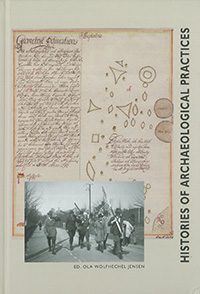
spara 16%
1 säljare
Histories of archaeological practices
Through the centuries archaeological practice and the conditions for surveying, mapping, excavating and documenting in the field have changed. Different practices have also co-existed, as institutions and organisations tend to develop their own procedure. The use of a certain practice has far-reaching implications for the results generated by excavations and surveys. Technical and methodological changes may also deeply affect the social organisation of labour, which is an equally important aspect of archaeological practice. But how was archaeological fieldwork actually performed, and why do practices change and differ? These processes have seldom been the focus of scientific studies, perhaps because they are perceived as secondary, detached from, or simply not important to the archaeological results. In this volume, the authors highlight various topics of past archaeological fieldwork, such as social organisation, implications of political as well as societal and economical circumstances, discursive issues and the will to define what 'proper' archaeological practice is, but also the life and death of equipment, methods and technologies.
Utgiven: 2012
ISBN: 9789189176478
Förlag: Historiska museet
Format: Inbunden
Språk: Engelska
Sidor: 335 st
Through the centuries archaeological practice and the conditions for surveying, mapping, excavating and documenting in the field have changed. Different practices have also co-existed, as institutions and organisations tend to develop their own procedure. The use of a certain practice has far-reaching implications for the results generated by excavations and surveys. Technical and methodological changes may also deeply affect the social organisation of labour, which is an equally important aspect of archaeological practice. But how was archaeological fieldwork actually performed, and why do practices change and differ? These processes have seldom been the focus of scientific studies, perhaps because they are perceived as secondary, detached from, or simply not important to the archaeological results. In this volume, the authors highlight various topics of past archaeological fieldwork, such as social organisation, implications of political as well as societal and economical circumstances, discursive issues and the will to define what 'proper' archaeological practice is, but also the life and death of equipment, methods and technologies.
Begagnad bok
219 kr259 krSpara 40 kr (16%) mot nypris
Fri frakt & skickas inom 1-3 vardagar
Köpskydd med Studentapan
Varje köp täcks av Studentapans köpskydd som säkerställer att boken kommer fram, att du får rätt bok och att skicket stämmer överens med beskrivning.



